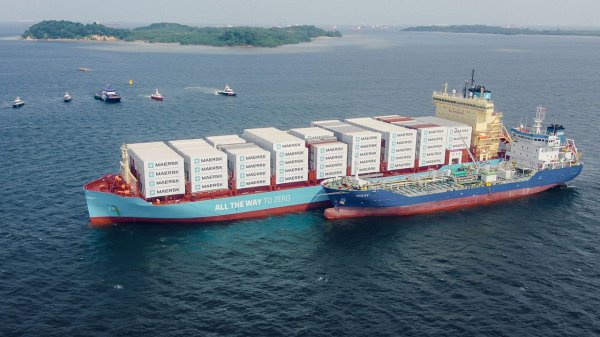No barriers to converting smaller, diesel engines for methanol bunkering: SUMMETH
Project concludes that the use of methanol in a converted single-fuel - and small - engine is feasible.
The Methanol Institute on Thursday welcomed the findings of the Sustainable Marine Methanol (SUMMETH) project, which has backed the increased use of methanol as a marine fuel.
The research concluded that there are no obstacles to the efficient use of methanol in a converted diesel engine and that smaller vessel conversion projects are feasible and cost-effective, with levels of safety that easily meet existing requirements.
In terms of environmental benefits, methanol is said to produce close to zero sulphur oxide (SOx) and particulate matter emissions and significantly lower nitrogen oxide (NOx) emissions compared to conventional marine fuels or biodiesel.
Joanne Ellis, Project Manager for SSPA, which led the research, says the partners sought to build on the work already carried out in earlier research projects - that resulted in the Stena Lines and Waterfront Shipping methanol dual-fuel vessels - using a vessel type that could use methanol in a converted single-fuel engine.
"The work on Stena Germanica and the Waterfront Shipping vessels proved the dual-fuel concept in larger vessels; we wanted to understand whether conversion of a smaller engine was feasible. We looked at a road ferry with an engine capacity of about 350 kW which makes short trips between the mainland and the island of Ljustero in the Stockholm archipelago, carrying people as well as cars, where there was a real desire to improve the emissions profile," Ellis explained.
Topic areas of the project's final reports include the technical feasibility of converting vessels to propulsion using methanol, the resulting environmental performance, bunkering issues and fuel supply now and in the future.
The research programme was conducted by SSPA, ScandiNAOS, Marine Benchmark, Lund University, the Swedish Transport Administration Road Ferries, Scania, SMTF and VTT Technical Research Centre of Finland.
Ellis added that as biomethanol increasingly becomes available, vessel operators will have the opportunity to blend in this zero-carbon fuel and progressively meet emission reduction targets set by the International Maritime Organization (IMO).
"The Swedish government has recently asked the country's Transport Administration to investigate making all of its ferries, pilot boats, icebreakers and workboats fossil-free by either 2030 or 2045, something that could make biomethanol increasingly attractive.
"Sweden has the potential to satisfy required demand for the biomethanol, which can be produced from renewable feedstock such as pulp mill waste, and there are several initiatives underway investigating the production of sustainable methanol," Ellis remarked.
SUMMETH also concluded that there are no barriers to bunkering ferries, since this is already carried out by truck and could easily be switched from diesel to methanol, enabling the ferry operator to immediately reduce particulate emissions and progressively reduce carbon emissions as renewable methanol becomes available.
The research concluded that there are no obstacles to the efficient use of methanol in a converted diesel engine and that smaller vessel conversion projects are feasible and cost-effective, with levels of safety that easily meet existing requirements.
In terms of environmental benefits, methanol is said to produce close to zero sulphur oxide (SOx) and particulate matter emissions and significantly lower nitrogen oxide (NOx) emissions compared to conventional marine fuels or biodiesel.
Joanne Ellis, Project Manager for SSPA, which led the research, says the partners sought to build on the work already carried out in earlier research projects - that resulted in the Stena Lines and Waterfront Shipping methanol dual-fuel vessels - using a vessel type that could use methanol in a converted single-fuel engine.
"The work on Stena Germanica and the Waterfront Shipping vessels proved the dual-fuel concept in larger vessels; we wanted to understand whether conversion of a smaller engine was feasible. We looked at a road ferry with an engine capacity of about 350 kW which makes short trips between the mainland and the island of Ljustero in the Stockholm archipelago, carrying people as well as cars, where there was a real desire to improve the emissions profile," Ellis explained.
Topic areas of the project's final reports include the technical feasibility of converting vessels to propulsion using methanol, the resulting environmental performance, bunkering issues and fuel supply now and in the future.
The research programme was conducted by SSPA, ScandiNAOS, Marine Benchmark, Lund University, the Swedish Transport Administration Road Ferries, Scania, SMTF and VTT Technical Research Centre of Finland.
Ellis added that as biomethanol increasingly becomes available, vessel operators will have the opportunity to blend in this zero-carbon fuel and progressively meet emission reduction targets set by the International Maritime Organization (IMO).
"The Swedish government has recently asked the country's Transport Administration to investigate making all of its ferries, pilot boats, icebreakers and workboats fossil-free by either 2030 or 2045, something that could make biomethanol increasingly attractive.
"Sweden has the potential to satisfy required demand for the biomethanol, which can be produced from renewable feedstock such as pulp mill waste, and there are several initiatives underway investigating the production of sustainable methanol," Ellis remarked.
SUMMETH also concluded that there are no barriers to bunkering ferries, since this is already carried out by truck and could easily be switched from diesel to methanol, enabling the ferry operator to immediately reduce particulate emissions and progressively reduce carbon emissions as renewable methanol becomes available.

|
VARO Energy expands renewable portfolio with Preem acquisition
All-cash transaction expected to complete in the latter half of 2025. |
|
|
|
||

|
NYK trials biofuel in milestone coal carrier test
Vessel is used to test biofuel for domestic utility company. |
|
|
|
||

|
H-Line Shipping orders LNG bunkering vessel
Vessel with 18,000-cbm capacity to run on both LNG and MDO. |
|
|
|
||

|
How to engineer and manage green shipping fuels | Stanley George, VPS
Effective management strategies and insights for evolving fuel use. |
|
|
|
||

|
Swedish government bans scrubber wastewater discharges
Discharges from open-loop scrubbers to be prohibited in Swedish waters from July 2025. |
|
|
|
||

|
MAN Energy Solutions achieves 100% load milestone for ammonia engine
Latest tests validate fuel injection system throughout the entire load curve. |
|
|
|
||

|
Petrobras secures ISCC EU RED certification for B24 biofuel blend at Rio Grande
Blend consisting of 24% FAME is said to have been rigorously tested to meet international standards. |
|
|
|
||

|
Stolt-Nielsen to fully control Avenir LNG with acquisition
Share purchase agreement to buy all shares from Golar LNG and Aequitas. |
|
|
|
||

|
Bureau Veritas supports launch of CIMC SOE's LNG bunkering vessel
Handover of Seaspan Energy's cutting-edge 7,600-cbm vessel completed. |
|
|
|
||

|
Methanol as a marine fuel | Steve Bee, VPS
How environmental legislation has driven the development of low-sulphur fuels and methanol-ready ships. |
|
|
|
||
Related Links
- · LeanShips project tests methanol on Volvo Penta D7 engine [Insights]
- · Plan to build methanol-fuelled ships for US-China project [Insights]
- · Chevron releases methanol and lubricants white paper [Insights]
- · UK researchers claim breakthrough converting CO2 and methane into liquid fuels [Insights]
- · UK scientists claim 'outstanding' results making methanol from thin air [Insights]
- · Germany christens first ship to be powered by methanol fuel cell [Insights]

